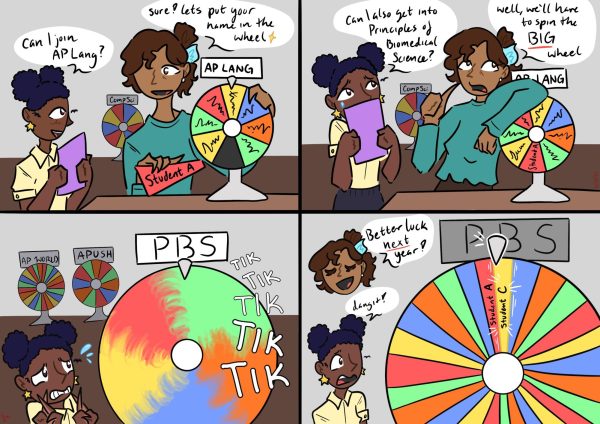Are Advanced Placement tests worth the time? (NO)
Every May, high school students nationwide stress out over taking Advanced Placement exams for their AP classes.
For many students who take these test, the question arises: Is it worth it?
AP tests are not worth the time and trouble because they create undue stress and results often don’t reflect students’ performance in the class.
The American Psychological Association reports that 30 percent of students claim they feel sad or depressed because of stress. This unnecessary stress creates an undesirable and harmful learning environment for students. This is the environment of an AP student.
AP tests are cumulative exams offered by The College Board that correspond with the course material covered throughout the school year.
The test is graded out of five points, with the minimum passing score being three or higher. Although some students may perform well and maintain good grades, they must pass the test in order to earn college credit.
If students don’t earn a passing score, they do not earn college credit for taking the course that year.
For a comparison of the AP grading system to the standard school grading system, scoring a five on the AP exam is an A+ or A, and scoring a four is an A-, B+, or B, according to The College Board. Most hardworking students aim for a four or five on these tests rather than a three, which is a B-, C, or C+. Although these grades seem fairly easy to achieve, there is an abundant amount of students who score below a three.
According to The College Board’s statistics on 2018 student score distributions, the percentage of students that passed the AP English Literature and Composition exam was 47.3 percent, meaning more than half of the students who took the test theoretically “failed” in the eyes of The College Board.
AP tests determine if students receive college credit for courses. If more than half of AP Lit students failed the AP test, then it is saying that the students did not comprehend the material covered during the school year. The score on the exam often does not correspond with students’ grades in AP classes.
In a classroom setting, many students feel more comfortable and less pressured. But in an AP testing environment, students become more anxious and increasingly apprehensive.
Studies from HealthLine,show that anxiety disorders affect 25 percent of teens, including test anxiety. AP tests are the most stressful of any exam, placing those with test anxiety at a disadvantage. The concept of test anxiety’s existence basically tells us that students who are affected by this ailment will most likely perform worse during a test because of this anxiety, which is inevitable for the worried student.
It is unfair to these types of students who don’t get the credit that they deserve because of such issues. If AP testing didn’t exist, then students would end with a grade that they deserve and wouldn’t have built up unnecessary stress and anxiety caused by the AP exam.
Many students take these difficult classes in order to demonstrate their skills in a working environment and challenge themselves with their schoolwork. But the scores they receive on AP tests should not reflect how well a student performs in the subject.
Although AP tests may be practical for colleges to measure the level of a student’s intelligence in a subject, it should not be the reality, as many of the AP exam scores differ from students’ actual grade in the class.

Kate Hong is a senior at Cal High in her third year for Newspaper. She began in 2017 as a staff reporter and is currently working as the A&E editor...

Michelle Nguyen is a senior at Cal High and is features editor for the Californian Newspaper. She’s also the publicist for Cal High Interact, Interact...


